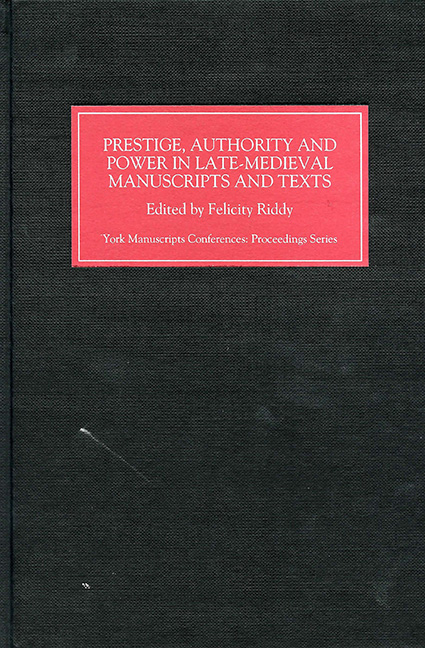Book contents
- Frontmatter
- Contents
- List of Plates
- Introduction
- Inventing Authority: Glossing, Literacy and the Classical Text
- Manuscripts of Nicholas Love's The Mirror of the Blessed Life of Jesus Christ and Wycliffite Notions of ‘Authority’
- The Patronage and Dating of Longleat House MS 24, a Prestige Copy of the Pupilla Oculi Illuminated by the Master of the Troilus Frontispiece
- Limner-Power: A Book Artist in England c. 1420
- A Poet's Contacts with the Great and the Good: Further Consideration of Thomas Hoccleve's Texts and Manuscripts
- The Politics of Book Ownership: The Hopton Family and Bodleian Library, Digby MS 185
- Piety, Politics and Persona: MS Harley MS 4012 and Anne Harling
- The Abbess of Malling's Gift Manuscript (1520)
- ‘Plutarch's’ Life of Agesilaus: A Recently Located New Year's Gift to Thomas Cromwell by Henry Parker, Lord Morley
- Manuscripts after Printing: Affinity, Dissent and Display in the Texts of Wyatt's Psalms
- Index of manuscripts
- Index of names and titles
- York Medieval Press: Publications
Introduction
Published online by Cambridge University Press: 24 October 2017
- Frontmatter
- Contents
- List of Plates
- Introduction
- Inventing Authority: Glossing, Literacy and the Classical Text
- Manuscripts of Nicholas Love's The Mirror of the Blessed Life of Jesus Christ and Wycliffite Notions of ‘Authority’
- The Patronage and Dating of Longleat House MS 24, a Prestige Copy of the Pupilla Oculi Illuminated by the Master of the Troilus Frontispiece
- Limner-Power: A Book Artist in England c. 1420
- A Poet's Contacts with the Great and the Good: Further Consideration of Thomas Hoccleve's Texts and Manuscripts
- The Politics of Book Ownership: The Hopton Family and Bodleian Library, Digby MS 185
- Piety, Politics and Persona: MS Harley MS 4012 and Anne Harling
- The Abbess of Malling's Gift Manuscript (1520)
- ‘Plutarch's’ Life of Agesilaus: A Recently Located New Year's Gift to Thomas Cromwell by Henry Parker, Lord Morley
- Manuscripts after Printing: Affinity, Dissent and Display in the Texts of Wyatt's Psalms
- Index of manuscripts
- Index of names and titles
- York Medieval Press: Publications
Summary
Prestige, authority and power: what is the significance of these three terms for the study of medieval manuscripts and texts? This is the question that the authors of the essays in this volume, ranging from the twelfth century to the sixteenth, have sought to address, and they answer it in different, but interrelated, ways. The essays are presented in chronological order, and in this way fall into four groups. The first two, by Suzanne Reynolds and Kantik Ghosh, discuss ideas of textual authority. The second pair, by Kate Harris and Kathleen Scott, are detailed studies of some de luxe manuscripts of the early fifteenth century, and present differing views about the patronage of one of these in particular. The third group, by John Thompson, Carol Meale and Anne Dutton, deals with prestigious fifteenth-century writers and readers of manuscripts and texts. The focus of the last group, by Mary Erler, James Carley and David Carlson, is on manuscripts in the era of print, during the reign of Henry VIII. Nevertheless the ideas of prestige, authority and power cut across this ordering and suggest different juxtapositions as well, as I shall show.
Prestige is probably the least problematic of the three terms; in fact, the idea that manuscripts are a source of prestige in the late Middle Ages seems so self-evidently true as to be hardly worth discussing. Written on parchment, opulently illuminated and handsomely bound, expensive manuscripts made for wealthy individuals or institutions were constituents of status; they belong with the equally fine horses, clothes, jewels and other luxury goods that were essential to aristocratic self-presentation, whether secular or religious. De luxe manuscripts of various kinds are the ones non-specialists are most familiar with: they are on display in exhibitions and in museums; they are tourist attractions; they offer themselves as static icons of prestige.
If the prestigious manuscript is familiar, so is the authoritative one. The idea that an auctor (author) was endowed with auctoritas (authority) through the way the text was presented on the manuscript page is now thoroughly familiar. It was initially an academic process: the scholarly commentaries and glosses that accrued to the ‘set texts’ used in grammar schools were the material means by which this kind of cultural status was constituted.
- Type
- Chapter
- Information
- Publisher: Boydell & BrewerPrint publication year: 2000



